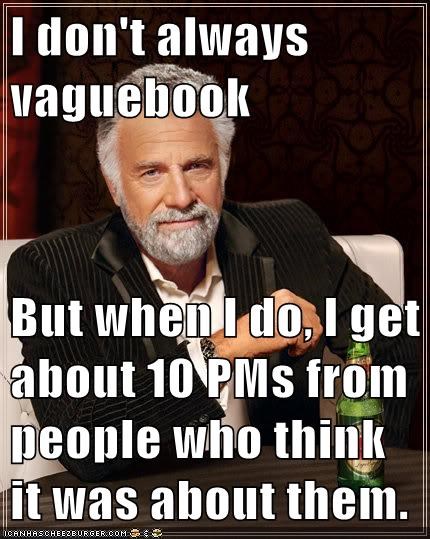The term Vaguebooking should be familiar to many a Facebooker: It’s when someone posts a status that is vague and lacking information, so much so that the many readers of the post is not sure what’s going on.
Vaguebooking is oftentimes defined as a sad cry for attention, such as when someone posts just simply “Oh man…”, maybe with a crying emoji, and absolutely no indication of what they’re down about. A call for attention, usually derided as a pathetic way of garnering sympathy, But vaguebooking can take many forms.
Sometimes people will post photos of themselves with other people, without offering up any names of said people or explanations of who the people are that they are posing with. Or maybe they will mention names, but not explain their relationship. Are they friends? Coworkers? Relatives?
And people will yawp about sports, or shows that they’re at, without giving enough information to qualify what they’re excited about. “Did you see that catch!” “This show is amazing!” Maybe they will include a picture or a screenshot, but usually not, and oftentimes the pictures is not enough to help out the reader of the post.
Sometimes Vaguebooking can become surreal. One Facebook friend of mine would post two to three numbers a day, numbers between 12 and 20, with absolutely no explanation of what they were about. That’s all the posts were, just a single number. No explanation, no hashtags, no nothing. Inquiries about what was going on were ignored. It was all very bizarre.
Vaguebooking is mostly annoying. But occasionally it can be infuriating, and in some cases undue alarm. It’s one thing to post “OMG! Did you see that play?” with no indication of what you’re watching, (Sometimes not even clarifying what sport they’re watching,) but people can also be reckless with much more imperative information, giving vague details about important personal matters, tragedy, and even death.

Facebook is not Linear
The First Thing: Facebook is not Linear. (That means your posts aren’t linear!) Like Commander Sisko explaining linear time to the Wormhole Aliens, (Star Trek Deep Space Nine reference, Season 1 episode 1,) I am here to explain to Facebookers that your posts aren’t linear.
When someone looks at their Facebook feed they don’t necessarily see your posts in order. In fact, they may see just your latest post. Many people throw up Facebook posts as if their dear FB friends had seen their previous posts or follow them one after the other in chronological order. It’s an unwarranted assumption that many people follow. “Watching the A’s game. Go A’s” Followed by “OMG! What a play!” followed by “That call was BS! I couldn’t believe it!” and so on. If they didn’t see the first part about watching an A’s baseball game, the following posts are confusing if they’re not properly clarified.
Someone sees the post “OMG! What a play!” without any hashtags or activity indicators or anything at all to indicate what the post is about. The user posting the OMG update has assumed that all of their friends are somehow aware that they are watching the Oakland A’s game, and will fully comprehend said post in its full context even though the statement stands naked and alone with nothing to give it any meaning other than your previous posts, which may or may not have been seen by the people reading it.
Annoying? Sure. But under some circumstances it can be alarming. A friend of mine announced on Facebook that she had just come out of surgery. That’s all she said. No indication of what kind of surgery had just been performed on her or any explanation of why she needed surgery. A previous post explained that she was having minor surgery for a condition that was not very serious, and half of her friends knew that, but the other half, including myself, did not know why she had gone under the knife. That half of her friends were sent into a tizzy, pleading on Facebook to tell us what was wrong and what had happened. For said friend is a motorcyclist, and we were all thinking the worst: That she had been in an accident and had been taken to the hospital as a result.
That was the kind of fright and stress we did not need. Vaguebooking is not always a case of just being irritating. It can cause undue stress, anxiety, and even panic in certain situations. In contrast, another friend of mine reported that her daughter was going in for minor surgery, and she not only indicated what kind of surgery she was having, but also posted a link to an article that explained, not only the malady that was causing her to go under the knife, but the surgical procedure to correct it.

So a careless vaguebook can cause people distress and can give the impression that something horrible has happened. But what if something extreme is going on? What if there is actual tragedy and heartbreak, or something acutely serious?
A friend of mine posted that he was completely shot down, and just didn’t know what to do. Obviously something quite bad had happened in his personal life, but he didn’t indicate in any way, shape, or form what had happened. One could only assume it had something to do with a passing, but there was no indication in his post that it was about the death of a loved one.
I messaged a mutual friend to ask what was going on. It turns out a family member had passed on, and he was not handling it well at all. Because of the nature of his post I didn’t think it was at all wise or proper to contact him directly.
When someone is suffering because of a devastating loss and chooses to express that on Facebook, it’s not always advisable to ask them to clarify. But a barbaric yawp of deep loss or personal pain can be very distressing and disconcerting for friends and family. Again, the assumption is that people will know what you’re talking about. But as I said before, that assumption can easily not hold true for the many of your friends list, given that you have a decently sized to large friends list. That an operation may turn out to be just a minor thing is one thing, but to indicate someone has died without saying who, that can cause serious stress, almost to the point of trauma. Are they talking about someone we know? Maybe a dear friend? Maybe a beloved family member?
You can’t wag a finger at someone who’s experiencing a sharp sense of grief, can you? When one is overwhelmed with emotions it can be difficult to think of others and think clearly. Maybe I can only say this: Think ahead. Think about what you would do under such circumstances, so when and if such a time comes around you will think before posting on social media.
Vaguebooking trauma can also come at the cost of being ignorant of all the facts. Several times I have learned about the deaths of colleagues or friends, which resulted in me sending pleading messages asking what had happened, only to get an “I don’t know” in response. Oftentimes people will report dire incidences without knowing all of the facts, and pleas from other friends and colleagues are met with online shrugs. Before posting, find out what’s going on, what’s happening, so you can let other people know. If you’re still just finding out and don’t have all the details, then maybe it’s best not to post.
I’ve written about this topic before, when people spread this kind of news they can become their own broadcasting company. News of peoples passing can spread like wildfire, even when some of the recently deceased’s friends and family don’t know yet, and even if all the facts are not clear. As I once wrote, a rumor that a friend of mine had died spread like wildfire throughout Facebook, even though not one person posting many of the numerous “I’ll miss you brother” posts had any details about his passing whatsoever, such as the most important detail: That he wasn’t even, in fact, dead, just injured in a car accident. As ridiculous as that sounds, many people suffered great distress and sorrow as a result of the erroneous reports of his passing.
How not to Vaguebook
A friend of mine was throwing up comments about his beloved Raiders during a game, the “OMG did you see that play?” type of comments. But he was also hashtagging them. #RaidersVersusChiefs. Another friend of mine exhalted over a Niners game, but used the Activities feature to indicate that she was watching the Niners play the Buccaneers.
That can be done with all kinds of posts. Don’t want to write a short novella explaining your context? Hashtag it! If you’re posting follow ups to a previous post, say so! (“See previous post!”) Or use the activities feature, or just check in. Check ins usually have an ongoing event tied to them. Easy peasy! Give your Facebook followers context!
Are you or a loved one having an operation? Going to court? Doing something very serious? Details details details! Why are you or someone close to you going under the knife? If it’s a semi-obscure or really obscure procedure and your friends list isn’t entirely made of doctors, you might want to explain what it is that’s happening, and maybe offer links.
I can only admonish Facebookers to think about how to handle real life sorrow and trauma. I’ve said in a previous blog post that no one person owns the grief of a loss. Context, information, and clarity is what’s desperately needed for huge life events, and also for the smaller ones that could be misinterpreted as something far bigger than it is.
Whether it’s the loss of a loved one, or watching a show, or cheering for a team, the Devils and Angels are always in the details. When you write a Facebook post, look at it as a standalone post. Ask yourself if it has enough information for someone who’s looking at just that post, with no knowledge of previous posts or of what is going on with your life in general. And in the cases of real life loss, ask yourself if it’s the right time to post, or if you should wait.